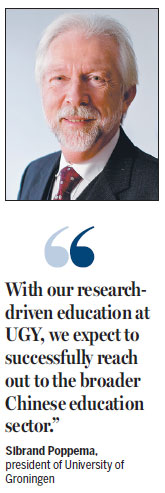Four centuries of learning spawn modern new university in Yantai
The University of Groningen, one of the Netherlands' oldest centers of learning, has taken a momentous step in its 402-year history by planning to open its first branch campus in Yantai in Shandong province.
Prior to the plan, UG already had several partner universities in China, but with its partners China Agricultural University and the City of Yantai, the new University of Groningen Yantai aims to set itself apart through its role as a research-intensive university.
By mid-2018, its campus will feature a 40,000-square-meter research institute that will further UG's vision of "scientific excellence, innovation and creativity".

This big move, which is aligned with UG's internationalization strategy, will enable its students to be educated in a world-class environment.
"Offering an international classroom experience and excellence in research are key elements of our university," said Sibrand Poppema, UG's president.
"With our research-driven education at UGY, we expect to successfully reach out to the broader Chinese education sector."
In the Netherlands, UG offers more than half of its BA and the vast majority of its MA programs in English, attracting students from more than 120 countries.
Of these, Chinese students make up the third largest group of international students at the university - fully 17 percent of UG's total student population.
UG also established its first chair in Chinese last year.
The British sinologist Oliver Moore is developing a Bachelor's program in Chinese Culture and Language at UG, as well as a Chinese-language training program for lecturers.
He also contributes to the Groningen Confucius Institute.
With a Nobel Prize already under its belt, thanks to alumnus Ben Feringa who won the award for Chemistry last year, UG expects to move further up the top 100 universities list made by the Shanghai Academic Ranking of World Universities.
"We fully understand that the best students go to the best universities, and today UG aims to become a global education leader," said Poppema. "We intend to attract more international students because we believe in positive globalization through education."
(China Daily 01/27/2017 page11)

 Shandong Culture and Tourism Consumption Season
Shandong Culture and Tourism Consumption Season Culture, tourism sectors pick up in Shandong as epidemic wanes
Culture, tourism sectors pick up in Shandong as epidemic wanes

